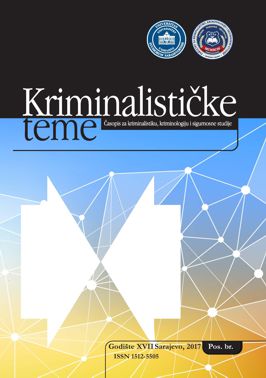PRIVATNI POLISING I RISK MENADŽMENT U SRBIJI
POLICING AND RISK MANAGEMENT IN SERBIA
Author(s): Dušan Davidović, Želimir KešetovićSubject(s): Security and defense, Criminology
Published by: Fakultet za kriminalistiku, kriminologiju i sigurnosne studije Univerziteta u Sarajevu
Keywords: Crisis management, policing; private security companies; Sector for emergency management; risk management solutions; Law on private security;
Summary/Abstract: Reason for writing and research problem(s): Privatization of security started in Serbia in 1990s when first private security companies were established. Besides taking care of people and property in regular circumstances they have to perform security task also during emergencies and disasters. Private security guards have always been on the first line when we speak about these kind of situations. Their first task- protection of property, people and business, they oftenly fulfill together with Sector for emergency management, police, military and other state actors and actors from civil society sector (Red Cross, Mountain Rescue Service etc.). In this article, the authors made an critical oversight of private security in Serbia today and they tried to explain its important role in complex processes of managing risks in protecting property, people and business. Aims of the paper (scientific and/or social): Scientific aim of the article is to introduce notion “policing” to Serbian security vocabulary since it is more propriate to cover all activities of the various social subjects directed to prevent crime and other social deviations. The aim was also to pay attention of the researchers and experts to important role of the of private security in prevention and risk management. Methodology/ Design: Attitudes presented in this article are mostly emerged from the content analysis that we used. Research/ paper limitations: There are two main limitation in preparing this article; (1) inadequate research data base on risk management praxis in Serbian corporations and other systems and; (2) incomplete licensing system for companies and employees, since that process is still in progress. Results/ Findings: As a system of knowledge and skills, parallelly with growth of professionalization of private security, risk management has been well developed since 2000. But, the praxis of these two is not enough developed. General Conclusion: Reasons for low level of praxis development we can find in relatively low level of “security culture” especially among ruling layer in corporation (especially those which are not private), although the voluntarism is also present in way of managing business in Serbia nowadays. On the other side, although the private security is present in so many companies, it is not enough involved in preventing and solving/managing risks.
Journal: Kriminalističke teme – Časopis za kriminalistiku, kriminologiju i sigurnosne studije
- Issue Year: XVII/2017
- Issue No: 5
- Page Range: 186-198
- Page Count: 13
- Language: Bosnian, Croatian, Serbian

